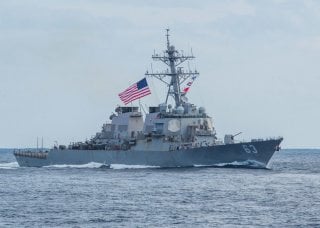America Is Using Its Navy to Deter China Around Taiwan and the Spratly Islands
How do these patrols work?
The U.S. Navy has conducted a Taiwan Strait transit to “demonstrate the U.S. commitment to a free and open IndoPacific,” according to a statement from Naval Sea Systems Command.
Navy destroyer USS Russel conducted the transit in the area, which borders the areas just North of the much-disputed South China Sea. Recent Chinese maneuvers, such as moving aircraft carriers into areas of potential threat to Taiwan, got the attention of U.S. and allied international observers, sparking public comments regarding the need for peaceful navigation and non-provocative exercises.
“The U.S. Navy will continue to fly, sail and operate anywhere international law allows,” the NAVSEA twitter post states.
While stated in a non-inflammatory way, the Navy transit does appear as a clear message to Chinese maneuvers in the region to remind the world of its commitment to Taiwan’s independence. Clearly, the Navy does not wish to be aggressive or provocative, but does want to express its resolve to challenge or counter Chinese activities it may deem somewhat threatening. While being on the periphery of the South China Sea, sensitivity regarding waterways near Taiwan to pertain to the broader, long-standing tensions regarding the South China Sea. While concern has never fully disappeared in recent months, it is increasing and moving back to the forefront in light of U.S.- Chinese tensions surrounding the Coronavirus.
The area in question is a group of highly disputed islands south of China in the South China Sea called the Spratly Islands. The small islands in the area, some of which are claimed by China, Vietnam, the Philippines, Malaysia and Taiwan, are rich in resources and of strategic geographical importance in the Pacific region.
Pentagon officials have, for quite some time, widely criticized an ongoing Chinese effort to erect artificial structures nearby or on top of its claimed island territories in the Spratly Islands. Called “land reclamation” by the Pentagon, the activity has added more than 2,000 acres to island territories claimed by China. In response to what the Pentagon regards as inaccurate and irresponsible claims, they have made the statement that there will at times be Freedom of Navigation Operations (FONOPs) to merely demonstrate that the U.S. military will fly, sail and operate wherever it chooses to according to international law. The FONOPs are explained as a peaceful way to take issue with what the Pentagon calls aggressive or expansionist behavior by the Chinese.
According to a United Nations Convention on the Law of the Sea—an international treaty supported by, but not yet formally joined by the U.S. —2-miles off the coast of a given territory is considered to be sovereign waters owned by the respective country. Therefore, on several occasions in recent years, U.S. Navy ships have ventured into a 12-mile vicinity of some South China Sea territories which, according to the U.S. and its allies, are erroneously claimed by China. These exercises have, in several instances, prompted immediate condemnation from Chinese authorities.
The ongoing “land reclamation” by China in the area appears to be a rather transparent attempt by China to reinforce and bolster extended territorial claims in the South China Sea.
However, the Law of the Sea Convention does not recognize artificial or man-made structures and legitimate island territories to be claimed. Therefore, the U.S and its Pacific allies do not support or agree with China’s aggressive territorial claims. In fact, citing the definition of islands articulated in the Law of the Sea Convention, Pentagon officials do not recognize the artificial structures as islands—but instead, refer to the effort as “land reclamation.” Under the U.N. Law of the Sea convention, negotiated in the 1980s and updated in the 1990s, an island is defined as a “naturally formed area of land above the water at high tide.” Also, article 60 of the U.N. Convention says, “artificial islands are not entitled to territorial seas.”
Kris Osborn is the new Defense Editor for the National Interest. Osborn previously served at the Pentagon as a Highly Qualified Expert with the Office of the Assistant Secretary of the Army—Acquisition, Logistics & Technology. Osborn has also worked as an anchor and on-air military specialist at national TV networks. He has appeared as a guest military expert on Fox News, MSNBC, The Military Channel, and The History Channel. He also has a Masters Degree in Comparative Literature from Columbia University.
Image: Reuters

